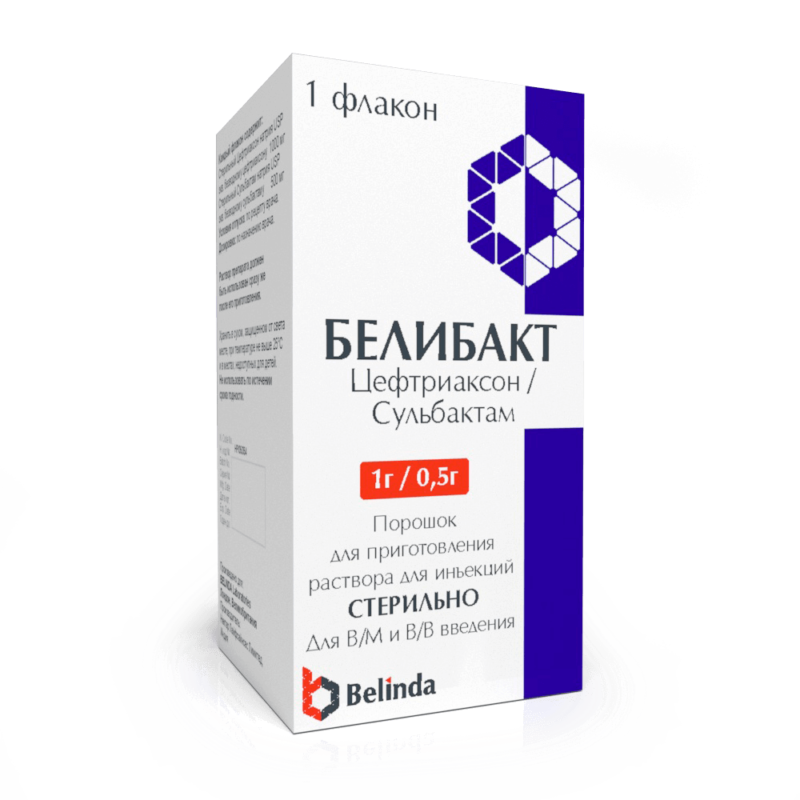
Belibakt
PRESCRIPTION
Belibakt has pronounced bactericidal activity against a wide range of clinically significant strains of gram-positive and gram-negative aerobes, incl. nosocomial, resistant to other antibiotics.
Manual
each bottle contains:
- Sterile Ceftriaxone sodium USP eq. anhydrous ceftriaxone 1000 mg
- Sterile Sulbactam Sodium USP eq. anhydrous sulbactam 500 mg
Bacterial infections caused by pathogens sensitive to the drug:
- infections of the abdominal organs (peritonitis, inflammatory diseases of the gastrointestinal tract, biliary tract, including cholangitis, empyema of the gallbladder);
- diseases of the upper and lower respiratory tract (including pneumonia, lung abscess, pleural empyema);
- infections of bones, joints, skin and soft tissues;
- infections of the urogenital zone (including gonorrhea, pyelonephritis);
- bacterial meningitis and endocarditis, sepsis;
- infected wounds and burns;
- chancroid and syphilis;
- Lyme disease (borreliosis);
- typhoid fever;
- salmonellosis and salmonellosis carriage;
- prevention of postoperative infections;
- infectious diseases in people with weakened immune systems.
The drug is also used to prevent infectious complications in the preoperative and postoperative periods.
Intravenously and intramuscularly.
Adults and children over 12 years old – 1-2 g (calculated as ceftriaxone) 1 time per day or 0.5-1 g every 12 hours, the daily dose should not exceed 4 g.
For newborns (up to 2 weeks) – 20-50 mg/kg per day.
For infants and children under 12 years of age, the daily dose is 20-80 mg/kg. In children weighing 50 kg and above, adult doses are used.
A dose of more than 50 mg/kg body weight should be administered as an intravenous infusion over 30 minutes. The duration of the course depends on the nature and severity of the disease.
For gonorrhea – intramuscularly, once, 250 mg.
To prevent postoperative complications – once, 1-2 g (depending on the degree of danger of infection) 30-90 minutes before the start of surgery.
During operations on the colon and rectum, additional administration of a drug from the group of 5-nitroimidazoles is recommended.
For bacterial meningitis in infants and young children – 100 mg/kg (but not more than 4 g) 1 time per day. The duration of treatment depends on the pathogen and can range from 4 days for Neisseria meningitidis to 10-14 days for sensitive strains of Enterobacteriaceae.
Children with skin and soft tissue infections – a daily dose of 50-75 mg/kg once a day or 25-37.5 mg/kg every 12 hours, not more than 2 g per day.
For severe infections of other localization – 25-37.5 mg/kg every 12 hours, no more than 2 g per day. For otitis media – intramuscularly, once, 50 mg/kg, not more than 1 g.